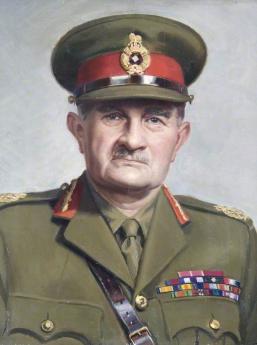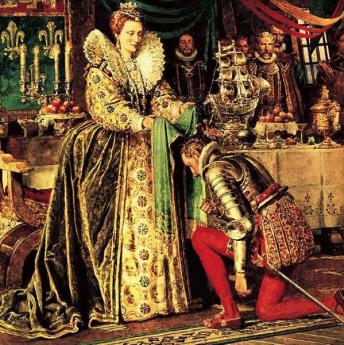Related Topics
Customs, Culture and Traditions
Abundant seafood made it easy to settle here. Agriculture takes longer.
Government Organization
Government Organization
Right Angle Club 2009
The 2009 proceedings of the Right Angle Club of Philadelphia, beginning with the farewell address of the outgoing president, John W. Nixon, and sadly concluding with memorials to two departed members, Fred Etherington and Harry Bishop.
Field Marshal William Joseph Slim, 1st Viscount, Order of the Garter

|
| Field Marshall William Joseph Slim |
It's impossible to be accurate about such rankings, but it must mean something when Field Marshall William Slim is the only officer of World War II to be ranked among the ten greatest generals of all time. The historian Ray Callahan recently described Slim's career to the Right Angle Club, with particular emphasis on how unlikely it was for a man of his humble beginnings even to be a Lieutenant in the British Army before World War I, how he endured pretty insufferable snubs along the way up the ladder of command, and how at the end of his career to be Chief of Staff he finally revealed that he had noticed those snubs, all right. Americans would be astonished at such class distinctions in their own army, and even raise the question how the British Army could possibly conquer the world for two hundred years with so little emphasis on merit selection of its generals.
First, the military story of Bill Slim. Before World War I, officer candidates were expected to pay for their own training, and he managed to get through a local college Officer Training course without enrolling in the college. Even that much training suddenly was in very short supply as Britain mobilized for the War, and he was commissioned with the limitation of "hostilities only" to emphasize that he was not in the "regular" Army. Working through the Mesopotamian campaign, he rose through the Indian Army, which Winston Churchill regarded as definitely second tier, with his permanent rank always lagging several levels below his "temporary", acting, rank. At one point, he received an official rebuke for advocating air power for ground support, since that was the turf of the Air Force, and on another occasion for irritating the Navy by using boats. When World War II suddenly sent Japanese forces plunging through Malaysia and Indo-China, Slim distinguished himself by keeping the defeated Indian Army intact through a 900 mile retreat into Burma, justifying his later memoir of turning Defeat Into Victory. During that demoralizing time, he had ample opportunity to observe the repeated Japanese tactic of launching lightning attacks without an established supply line, intending to live on the abandoned supplies of enemies as they were outflanked or surrounded by rapid advances. Slim developed the idea that if he's surrounded troops could be resupplied by air and hold out, the attacking Japanese would essentially starve to death in the jungle. One attacking Japanese army unit of 87,000 men was reduced to 13,000 survivors by the application of this strategy, and as long as the Japanese kept using their technique, Slim kept using his. One reverse variant of this use of air supply was employed by Slim in the recapture of Rangoon by himself attacking from the rear without the usual overland supply line, but resupplying by air as an approaching monsoon cut off the expected resupply by sea. After the war was over, Winston Churchill's history of the war's events contained only the briefest mention of these victories. When Slim finally met Churchill, a close election was taking place, and Churchill said he hoped the overseas ballots were cast for him. "Well, Prime Minister, I must say that no officer in my command voted for you," was the reply he got. When Churchill's successor Clement Attlee was told by Bernie Montgomery that the Chief of Staff position was promised to someone else, the terse order was, "Well, unpromise him." And Slim got the job.

|
| Sir Francis Drake kneeling to Queen Elizabeth |
So, Ray Callahan the historian was asked the typically American question of however could the British Empire conquer Napoleon or plant the British flag over most of the world, using a system that would deliberately hold back an officer of Slim's talents, snubbing and intentionally humiliating most of the nation whenever one of the lesser orders was cheeky enough to aspire to military leadership. With great patience, Callahan replied that this system of placing aristocrats in charge of the military was designed to maintain civilian control against the military uprising. There might have been a time when King Arthur or King Henry V was personally in charge of the Army, but King Macbeth and General Cromwell both illustrate the disadvantages of a fully feudal system. Even before the Industrial Revolution, military skill did not translate well into the skills needed to run an industrialized country but nevertheless provided an easy route for a power-hungry military to seize the crown. It is true that America tends to elect prominent generals to be president after each of our major wars (Washington, Jackson, Harrison, Grant, and Eisenhower) and indeed most other presidents have had some military experience. But ever since George Washington made the principle clear, there has been a prevailing imperative about maintaining civilian control of the serving military, which even the American military seem to agree with. So it is not surprising that other nations with some more bitter experiences to recall insist on more than social pressure to maintain civilian control. Inherited wealth not only provides genetic advantages and a de-glamorized experience with power, but it tends to create its own local environment which regards power as scarcely worth striving for, power is what you have, not what you strive for, there's not a great deal to gain from overturning things. While not inordinately brilliant, hereditary aristocrats are not inordinately stupid, either; they produce their share of Wellingtons, Patton and Macarthurs.
In the first World War, however, the British discovered a serious flaw in the aristocratic system. Most defenders of that system will stress the high morale developed within the comradeship of a 1000-man regiment, carefully selected to choose individuals who "fit in". The British Army has been described as a "loose federation of regiments", collecting the history and traditions of the British Army in a way best understood in America by noting the special fervor of the U.S. Marine Corps. There is an undeniable disadvantage, however. In a mass mobilization, following a selective mass slaughter of volunteers (90% of British Regular Army officers were casualties in World War I), there simply may not be sufficient numbers in the historic regiments to run an effective mass army. That is the implied recognition behind the creation of officers for the duration of hostilities, only; get rid of that sort when the war is over because they can become a threat to cohesiveness. Some of that concern surely runs through the steady drumbeat to take guns away from the public, Second Amendment notwithstanding, repeal that damned thing if you have to. And the converse runs through the thinking of the Second Amendment supporters; you never know when some power freak might seize control of the military. The southern half of the country leans more strongly in that direction. They remember the experience of Reconstruction when official reins of power were in hostile hands. The Old South really likes the idea of its sons running all branches of the military at all levels. Makes a fellow more comfortable with having a strong government.
Originally published: Tuesday, January 27, 2009; most-recently modified: Friday, May 17, 2019
| Posted by: A J Gordon | May 27, 2011 10:52 AM |
However Slim must be one of the finest in anybody's army. It's "to the manor born" "old chap".
| Posted by: A J Gordon. | May 27, 2011 10:47 AM |
I cannot but believe that had Slim been in command of the British side of OVERLORD, Caen would have been taken on D-Day. Slim's army would've known that he expected them to take Caen. He would have told them that --personally, as he did consistently in Burma.. They would not have let him down. Taking Caen would have been THEIR objective -- because it was his.
It's not unreasonable to speculate that Slim wasn't even considered for OVERLORD because in the British Army he was not, so to speak, to the manner born. What he was accomplishing in India and Burma was little more than an annoying side show to Whitehall, to be acknowledged grudgingly, if at all.
| Posted by: Fritz Steiner | Aug 7, 2009 7:22 AM |